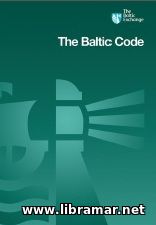 The present publication contains the Baltic Code which is considered to be one of the vital documents setting out the standards; subject recognized standards are expected from the members of the Baltic Exchange. The publication starts with the introduction and general info on the Baltic Exchange, followed by chapter dedicated to the ethics and market practice.
The next chapter provides some guidance to the modern shipping market practice together with the relevant terminology. After that, several chapters come dealing with the chartering and associated negotiations, chartering of the tankers, relevant disputes, ship sales and purchases. The closing chapters of the volume address the insurance matters, freight derivatives and associated organizations. This formal paper was initially released many years ago in 1983 and substantially revised in 2012. It has been arranged in three major sections. We would particularly recommend the section containing the short yet very comprehensive introductory guide to the shipping practice of today since it has already been found very useful by the Baltic members.
At the time when this volume was compiled, Baltic members did represent their interests through more than six hundred companies operating all around the world. Have a look into this paper in order to be aware of the information definitely useful to any participant of the shipping industry.
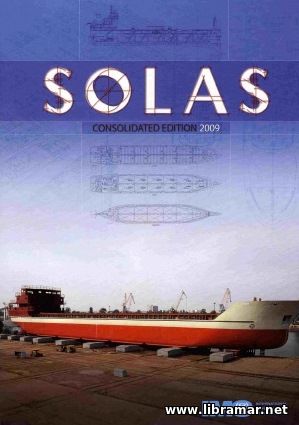 The IMO publication which does not require any special introduction. The most important and basic international convention. The must-have document on board any ship and in the office of any shipping company; the necessary one for the marine surveyors, port state control inspectors, and even students - i.e. anyone whose day-to-day activities are related to the safety of human life at sea.
Traditionally, the content of the document is divided into twelve major chapters. The first chapter provides the general provisions. The second chapter has been divided in two parts addressing the construction of the ship, namely structure of the ship, subdivision of the hull, stability of the vessel, ship machinery and electrical installations on board. The next three chapters deal with the lifesaving appliances, radiocommunications and navigational safety. Then, there come two chapters addressing the carriage of cargoes and dangerous goods in particular.
There is one separate chapter on nuclear ships. The remaining chapters are dealing with the management of safe operation, safety measures for HSC, i.e. high-speed crafts, measure to enhance marine safety and security, and some additional measures applicable to the bulk carriers. The appendices contain sample certificates that are issued to the ships fully complying with the requirements of the Convention.
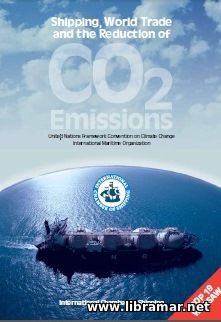 This booklet contains the useful materials of UN "Framework Convention on Climate Change", that is directly relating to the reduction of the CO2, i.e. carbon dioxide, emissions, as applied to the shipping industry. It was released by the ICS. There are following short articles contained in this leaflet - UNFCCC Must support IMO, International Shipping - Servant of World Trade, Reducing Shipping's CO2, CO2 Reduction Measures for Shipping Should Be Led by IMO, IMO Agreement on CO2 Technical Rules, Taking Account of CBDR, IMO Is Also developing Market Based Measures, IMO's Track Record on Environmental Regulation, explaining how Shipping Is Shipping Its Carbon Dioxide Emissions, Alternative Fuel Sources.
The maritime industry of today is considered responsible for approximately ninety percent of all world trade and is therefore critically important to the normal functioning of the economy. It is quite obvious that without shipping, the trade between continents, transportation of raw materials and both import and export of affordable gods and food would not be possible. The availability of the maritime transportation, its relatively low cost and also high efficiency made the industrial development in Asia and other emerging economies possible...
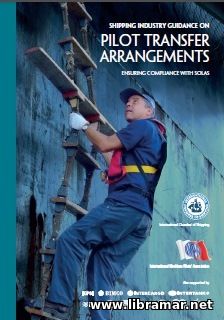 The present useful and practical industry guidance was released by ICS, i.e. International Chamber of Shipping in close co-operation with IMPA, standing for the International Maritime Pilots Association, and this was also supported by Intertanko, BIMCO, Intercargo, IGP&D, ITF, IPTA, OCIMF, IFSMA, CLIA, and The Nautical Institute.
The ultimate purpose of this publication was to ensure due compliance with the applicable principal requirements concerning the rigging of the pilot ladders, as outlined in Regulation 23 of SOLAS Convention. Pilot comes aboard ship to provide required professional assistance to the crew in the most critical and hazardous phases of the voyage.
He possesses particular specific local knowledge and shall also have all necessary ship handling skills to contribute to the safe arrival/departure of the ships. Generally, pilots come aboard and disembark utilizing traditional rope ladders to and from pilot boats.
However, it shall be noted as necessary that this procedure could be very dangerous if the people involved do not strictly adhere to the IMO standards or in case they really fail to practice acceptable skills of good seamanship. Unfortunately, some pilots have lost their lives as a result of numerous accidents that occurred at the time of boarding and disembarking...
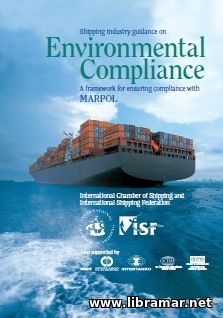 The shipping companies that are operating in today's maritime world may vary by type of operation, their size, management philosophy, private or public status etc. This would eventually lead to differences among company systems where differing management systems and vocabulary are used.
This guidance was prepared by ISF and ICS in order to serve as some kind of a practical template which is suggested to be utilized in the course of the review of the shipping companies compliance programmes that are adopted in accordance with existing regulatory requirement. Such of the requirements have been developed by IMO and this framework is also supported by such recognized international organizations as OCIMF, BIMCO, SIGTTO, Intertanko and Intercargo.
As it comes quite clear from the title of this document, the main intention of the authors of the paper was to provide the participants of the shipping industry with the necessary regulatory framework which should be used for ensuring the due compliance with all requirements outlines in the MARPOL Convention. In fact, the document would be applicable to prevention of all possible types of marine pollution from vessels that is why we would definitely recommend all ship officers to take some time going through the content...
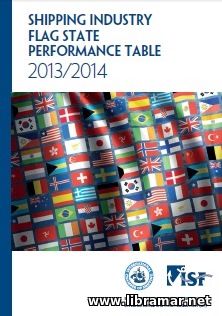 Another useful and practical publication prepared by ISF and ICS specialists. This Table has been initially intended to serve two main purposes. The first of the purposes would be to encourage the operators of the vessels as well as their owners to examine if the flag state administrations have sufficient substance before using it.
The second purpose of this booklet is to encourage operators and ship owners to put more pressure on flag authorities for necessary improvements related to safety of life at sea plus environment protection as well as provision of decent living and working conditions for seafarers. The information contained in the Table will definitely be useful once it comes to the assessment of the flag states performance. The Table is intended to summarize the factual data in the public domain that may be helpful when applied in the process of the performance assessment of flag state authorities.
Of course, it shall be used with the due care. Though only some particular time period is covered within this paper, as it is evident from the title, the information in the document will still be of some use for people involved in any dealings with the flag authorities so we would recommend them to have a look in the paper.
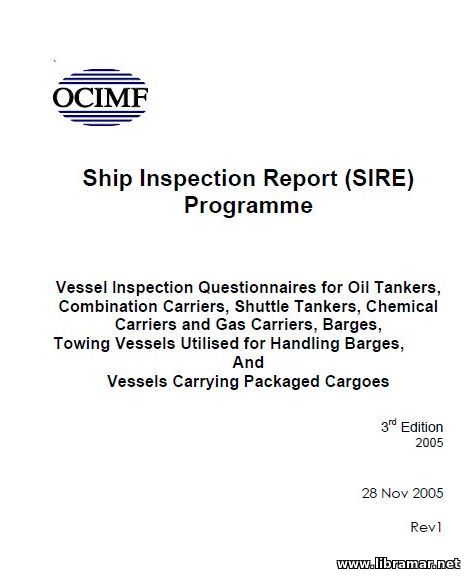 The present OCIMF publication starts with a brief historical overview of the programme which was worked out and implemented by OCIMF some decades ago with the sole intention to provide all the members of this organization with the opportunity to release and submit the ship inspection reports for distribution. The participation in the subject programme is fully voluntary.
Two revisions were made to this programme in 1997 and 2007 years and they have also been dealt with within the paper, together with the procedure for the uniform vessel inspection. The second section of the book contains the questionnaires to be used during the vessel inspections, as well as the inspector manuals. The third section is mainly dedicated to the VIQ, standing for the "vessel inspection questionnaire", and its availability to ship operators.
The remaining sections cover the conduct of inspections, distribution of the reports, some general notes, certification and associated documentation, management of the ship's crew, ship navigation issues, safety management, prevention of the marine pollution, cargo handling/ballasting systems of the vessel - petroleum/chemical/gas, mooring arrangements, communication, machinery and steering compartments of the vessel, general appearance and technical condition of the ship. All information that has been provided in the present publication was verified to be fully up-to-date and definitely practical.
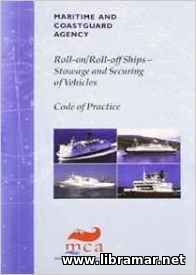 Another official MCA release, this one containing the provisions of the Code of Practice related to the stowage and securing of the vehicles carried on board of the ro-ro vessels. The authors of the present Code have consulted the HSE executive responsible for enforcing the associated Docks Regulations together with all other shore-based regulations, in the course of preparation of the document.
The experience that have been collected in operating the ro-ro vessels has enabled the IMO to develop the relevant technical standards with the ultimate intention to improve the safety of ro-ro transportation. This volume includes the standards that have been developed by the IMO and provides required technical guidance and information covering the established and proven safe procedures that shall be followed at the time of the roll-on and roll-off operations; when followed, these procedures will significantly reduce the risks to the people and vessels associated with subject operations.
The book is arranged in eight sections covering the principal sources of danger on board, personnel safety, vehicle decks and ramps, associated lifting appliances, suitability of the vehicles for sea transportation, stowage/securing of transported vehicles, specialized cargoes and vehicles, CSM (i.e. cargo securing manual), and related publications plus three annexes...
« 1 2 ... 17 18 19 20 21 ... 24 25 » |







